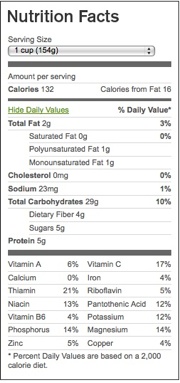Nutritional components
One of the reasons maize is a staple food across the world is its high nutritional value, with high levels of starch and also valuable proteins and oils. Depending on the variety, maize may contain a number of important B vitamins, folic acid, Vitamin C, and provitamin A (i.e., precursor to vitamin A). Maize is also rich in phosphorus, magnesium, manganese, zinc, copper, iron and selenium, and has small amounts of potassium and calcium. Maize is a good source of dietary fiber and protein, while being very low in fat and sodium (salt). However, maize is naturally deficient in lysine and tryptophan, which are two of eight amino acids regarded as essential for humans, so it needs to be part of a balanced diet.
Maize has tremendous variation in content and composition of several colored pigments collectively known as carotenoids (see also Carotenoids). Notably, the carotenoid beta-carotene (or provitamin A) is converted to vitamin A by normal metabolic processes in the body. Vitamin A is very important to human health, but most especially for vision, and as an antioxidant. Therefore maize can be especially important to people who cannot get fresh vegetables year round.

Different types of maize may vary in their nutritional content. Sweet corn types have more sugar, while darker yellow varieties may have more Vitamin A. Here are figures for a typical cup of sweet corn.


